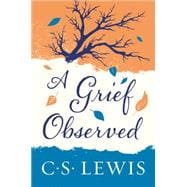About This Book
A Grief Observed by C.S. Lewis is a poignant and deeply personal reflection on the fundamental issues of life, death, and faith in the midst of loss. Written after his wife's tragic death, this book is an honest and unflinchingly truthful account of how loss can lead even a stalwart believer to lose all sense of meaning in the universe. It is an inspirational tale of how Lewis gradually regains his bearings and finds solace in his faith.
Who Uses It?
Primarily, this book is used by those who have experienced significant loss and are seeking a thoughtful and spiritual perspective on grief. It is also a valuable resource for students of theology, philosophy, and literature, as well as anyone interested in understanding the complexities of human emotion and faith.
History and Editions
First published in 1961 under the pseudonym N.W. Clerk, *A Grief Observed* has been a classic work on grief for over six decades. The book has been widely read and studied for its profound insights into the human experience of loss and its impact on one's faith. The 2001 edition, published by HarperOne, remains a widely available and respected version of the text.
Author and Other Works
C.S. Lewis was a renowned author, philosopher, and theologian. He is best known for his works such as *The Chronicles of Narnia*, *Mere Christianity*, and *The Problem of Pain*. His writing style is characterized by clarity, depth, and a unique ability to make complex theological concepts accessible to a broad audience.
Detailed Information
ISBNs and Formats
- Paperback: ISBN-13: 9780060652388 (The ebook for "A Grief Observed" is available right here on eCampus.com!)
- E-book: ISBN-13: 9780060652395 (The ebook for "A Grief Observed" is available right here on eCampus.com!)
- Miniature Edition: ISBN-13: 9780060652401 (The ebook for "A Grief Observed" is available right here on eCampus.com!)
Publication Details
- Publisher: HarperCollins Publications
- Publication Date: March 15, 2010
- Number of Pages: 106
- Language: English
- Item Weight: 4 ounces
- Dimensions: 8 x 5.25 x .25 inches
Rental Options: Available through eCampus.com with various rental durations.









